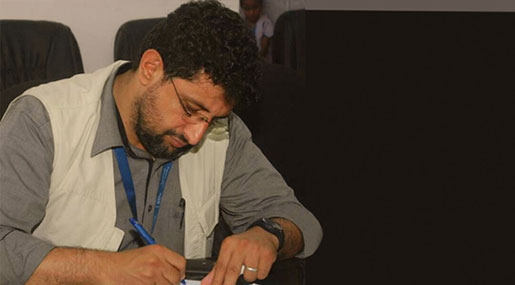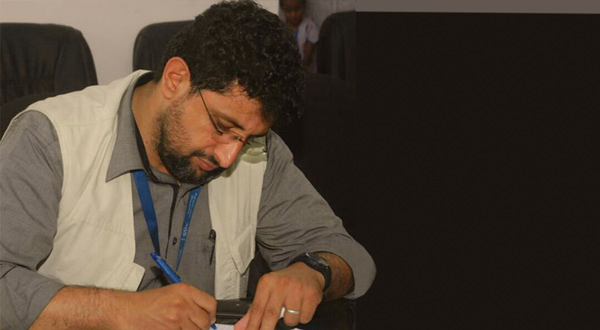
Yemen’s Director for Humanitarian Affairs: Displacement Catastrophic, Situation Deteriorating in All Respects

Local Editor
"The problem of displacement is a catastrophic problem in the world. The situation is deteriorating in all respects. The targeted groups are increasing and the numbers are doubling," said the director of the National Authority for Humanitarian Affairs in the Yemeni capital Sana'a, Abdulwahab Sharaf al-Din.

"We are still suffering from this problem in the absence of coordination or any great great response from the international system," Sharaf al-Din told the U-News agency.
"When we talk about the UN role, it does not mean that we are throwing our burden on them. But we are members of the United Nations. They have to do their part. They have rights and commitments. They have not carried out their commitments in the required manner, which led to the move of the Central Bank, the aggravation of the economic situation, and the reason for the issue of land, air and sea ports."
"We are informing the concerned parties in the international community that they are still the main cause for the worsening humanitarian situation inside Yemen, and if you are not held accountable by the honorable nations in the world, you will be held accountable by history. Therefore, there must be a united vision at the global level to solve this humanitarian catastrophe," he continued.
Sharaf al-Din added, "The numbers are on the rise. We are talking about some 60,000 families of displaced people and more than 75,000 families from the other categories including the underprivileged and the marginalized. The staff of the state have joined these figures, especially after the transfer of the bank [to Aden], the employees were displaced and joined these groups."
He pointed out that "there is a continuous rise of displaced persons from the Taiz province in particular. There are about sixteen thousand families. And the influx is still very large. Some districts of Hodeida, Marib and Al-Jawf also saw this rise. The problem is no longer related to the catastrophic war. The problem has been transformed from a war catastrophe to a political catastrophe where means to survive is difficult to come by. Displacement now bears several criteria. It has become a war of economic aggression and forcibly displacing the population from the southern provinces as well as the province of Taiz."
"We are concerned with the humanitarian issues and the displaced people in the capital's secretariat come from everywhere where military confrontations are taking place," Sharaf al-Din said. "There is a big gap between humanitarian needs and what we can provide, and we have no source to serve the displaced except international organizations. Servicing the displaced is based on humanitarian work under normal circumstances. The government always holds the chief responsibility, and then comes the community initiative sector."
We are oppressed and in a critical humanitarian situation and we have to be steadfast
"We had a large number of displaced people in the capital Sana'a. The displaced units were integrated with the National Humanitarian Affairs Commission. When we came, all groups became our responsibility. Our problems were no longer with the displaced. But we had to cover all the categories including the poor, the disabled, the marginalized and the widows."
"The criteria for the displaced as well as many of their categories were set," Sharaf al-Din explained. "We are betting on the people and the steadfastness of the displaced and bearing the burden. We tell the displaced that your patience and steadfastness is no less than those along the frontlines."
"As far as the health aspect is concerned, we coordinated with hospitals and government centers to receive the displaced. We also arranged with private hospitals to obtain grants for the displaced."
"We scheduled an appointment with the private sector syndicate to coordinate with them to provide free grants. Some medical laboratories complied with this and other hospitals showed their cooperation in this field," Sharaf al-Din stated. "We believe that we are oppressed and that we are in a critical humanitarian situation and we have to be steadfast."
"We have worked on equipping centers to receive patients with chronic diseases. There are some international organizations that are taking care of this area."
We have several projects related to employment opportunities, training, rehabilitation and the involvement of displaced persons in society
"Any event that occurred in the south throughout history has reflected on the north but not vice versa. Throughout history we have been suffering as a result of the southern regions and we are always the incubator," Sharaf al-Din asserted.
"The recent events in Aden resulted in the arrival of many families to the capital's secretariat. We received them despite the knowledge that breadwinners of some of these families are fighting on the fronts in the ranks of the coalition forces. We are brothers. We were divided by the dirham and the dinar," he said.
"We coordinated with the leaders in different regions to register all arrivals to the secretariat of the capital."
Regarding the aid being allocated for southern Yemen by coalition states, Sharaf al-Din says "When we heard that there was an amount dedicated for humanitarian aid from the King Salman Center, we were optimistic that the Yemenis who are in areas not under army and the popular committees' control would benefit. But it turned out that this relief was part of a media stunt and lies that the coalition countries use to appear charitable."
"We have several projects related to employment opportunities, and there are projects related to training, rehabilitation and the involvement of displaced people in society, to facilitate their livelihoods and normal life. We say to the displaced, thank you for your steadfastness in times of oppression and greed, and we thank the community of Sana'a and Yemeni society."
We are suffering from a big gap, but efforts continue to be exerted to cover people's needs
"The health sector in general was plagued by problems before the war on Yemen. The whole issue is that the situation is catastrophic, and we believe that there are efforts that will meet the needs and provide financial support. We are working to urgently respond to the care of patients with chronic diseases."
"Despite the difficult situation, we have been probing for people with chronic diseases, with the aim of allocating financial support for them," Sharaf al-Din said.
"On the subject of education, coordination has been made with the brothers in the Ministry of Education as well as universities to accommodate the displaced," he added. "Today, we have more than 95,000 displaced students in different stages of education. It is a large number in a small area like the capital's secretariat. There were free grants at the university. And we have more than 400 grants this year for the displaced and the affected groups. It is true that the gap is big, but efforts are in place to cover people's needs."
Source: U-News News Agency, Translated by website team
Comments



